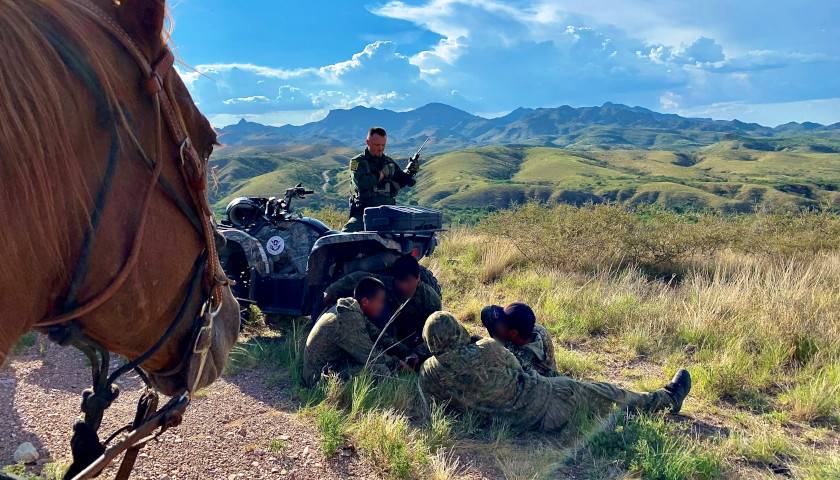The Arizona Supreme Court issued a unanimous ruling on Thursday reversing an award of sanctions against the Arizona Republican Party (AZGOP) and its attorneys for bringing an election integrity lawsuit. The AZGOP sued Maricopa County election officials over how they conducted the mandatory hand count audit after the 2020 election. The state’s highest court said there is some merit to election lawsuits, even if a “long shot,” and ruling against them for questioning an “election’s legitimacy” would have a “chilling effect.”
The AZGOP issued a statement after the state Supreme Court’s decision.
“We are pleased with the Supreme Court of Arizona’s decision to reverse and vacate the attorney fees awards previously levied against us,” the AZGOP said. “This ruling reaffirms the fundamental legal principle that raising questions about the interpretation and application of election laws is a legitimate use of the judicial system, not a groundless or bad faith action. We remain committed to ensuring that election laws are followed precisely, upholding the integrity of our electoral process.”
🚨 VICTORY IN COURT! 🚨
The Arizona Supreme Court defends our right to question and ensure the integrity of election laws. 🇺🇸 🏛️ pic.twitter.com/5aRSMFcKXj
— Republican Party of Arizona (@AZGOP) May 2, 2024
Arizona Supreme Court Justice John R. Lopez, who authored the court’s opinion last month upholding Arizona’s 1864 law banning almost all abortions, wrote the opinion, which reversed Maricopa County Superior Court John Hannah’s opinion and vacated the Arizona Court of Appeals’ opinion.
Hannah issued multiple decisions previously against Kari Lake’s election lawsuit.
The opinion summarized the court’s findings, “We hold that the attorney fees award was improper because Petitioners’ claim was not groundless, thus obviating any need to determine whether the claim was made in the absence of good faith.”
First, the opinion reviewed the facts leading up to the controversy. County officials are required by A.R.S. 16-602(B) to conduct minor hand counts after elections. The county political chairs of each party choose ballots from 2 percent of the precincts, selecting which precincts. If there are significant inaccuracies, then the hand count is gradually expanded.
The state’s 2019 version of the Election Procedures Manual (EPM) prescribed that the hand count could be done by choosing vote centers in addition to precincts. After the hand count was conducted from vote centers, the AZGOP sued Maricopa County election officials for failing to follow the statute and conducting the hand count from precincts.
Hannah dismissed the lawsuit, alleging various “procedural defects,” the opinion stated. Hannah did not address the issue of whether the EPM contradicted state law. He ruled that the complaint was both groundless and made in “bad faith,” awarding $18,237.59 in attorneys’ fees against the AZGOP and its attorneys under A.R.S. 12-349(A)(1).
The state’s highest court observed that it was a high bar to overturn the trial court’s decision, “We defer to a trial court’s findings of fact unless clearly erroneous.”
The court noted that Hannah didn’t consider the merits of the case, dismissing it instead on procedural grounds. However, they pointed out that Hannah still made a derogatory remark about the merits of the case anyway.
“[T]he trial court chided Petitioners for focusing on ‘what section 16-602 says about hand count audit procedures’ rather than addressing the ‘procedural defects’ leading to dismissal of the complaint and the Secretary’s attorney fees motion,” the justices said. “Nonetheless, the trial court dismissively described Petitioners’ interpretation of § 16-602(B) as ‘barely colorable’ despite its avowed disinterest in the merits and lack of substantive analysis.”
The court said this was an error since there was some justification for the merits.
“Facially, Petitioners’ claim is more than barely colorable in this context,” the court held. “Petitioners correctly point out there is a plain-language conflict between § 16-602(B), which requires a precinct hand count, and the 2019 EPM, which permits a voting center hand count.”
Next, the court analyzed the procedural grounds Hannah claimed justified the sanctions. The court said Hannah ruled that the complaint was groundless since “Petitioners’ requested declaratory and mandamus relief was unavailable as a matter of law; and second, because this Court’s election law jurisprudence foreclosed Petitioners’ post-election challenge to a pre-election procedure.”
The court noted that the appeals court found that laches, which means there was an unreasonable delay in filing a lawsuit, contributed to finding the complaint groundless.
First, in regards to Hannah finding the suit groundless since the AZGOP sued county election officials, not the Arizona Secretary of State, the higher court found that the single case Hannah relied upon might not even have been correctly written itself.
“In paraphrasing Yes on Prop 200, the court changed the indefinite articles to definite ones, thereby incorrectly implying the existence of a single proper defendant in a procedurally valid declaratory action,” the court analyzed regarding the Arizona Court of Appeals’ decision in Yes on Prop 200 v. Napolitano.
The court stated that Yes on Prop. 200 held that plaintiffs must “sue the governmental entity responsible for implementing the challenged hand-count procedures.”
The court said that is what the AZGOP did. Additionally, the court noted that the secretary of state intervened in the case one day after the AZGOP filed the complaint.
The court criticized Hannah, “It is untenable to invoke an alleged procedural defect like the one in this case — readily remediable and, in fact, remedied one day after the complaint was filed — to irrevocably mar a complaint as groundless.”
The court concluded that section of its analysis stating that Hannah had erred, and summarizing, “Whatever the Secretary’s interest in Petitioners’ declaratory action, it was fairly debatable whether Petitioners’ naming of the County as a defendant in their complaint was adequate, and, regardless, the parties agreed to the Secretary’s intervention just one day after the complaint was filed.”
Second, the court addressed Hannah’s claim of another procedural defect, that the mandamus relief requested was not available. Hannah said the AZGOP could not obtain a hand count conducted by the precinct. The court’s opinion contradicted Hannah, “Contrary to the court’s reasoning that mandamus is unavailable if a public officer lacks discretion in the discharge of duties, actually the converse is true — mandamus is only available when a public officer lacks such discretion.”
The court said Hannah erred again, concluding on the issue, “[H]ad Petitioners’ claim that the challenged 2019 EPM provisions were void because they contravened § 16-602(B) been correct, their requested mandamus relief could have constituted a valid attempt to enforce a public officer’s non-discretionary duty.”
The court said it declined to rule on the merits of whether there was a conflict, adding, “Here, however, we only hold that Petitioners’ requested mandamus relief was not groundless because it was at least fairly debatable, even if a ‘long shot,’ whether the County was obligated to conduct a hand count consistent with § 16-602(B) or an arguably conflicting EPM provision.”
Third, the court addressed Hannah’s “ruling that Petitioners’ claim was groundless because their post-election challenge improperly contested a pre-election procedure.” Citing case law, the court found, “It is debatable, however, whether a statutory post-election hand count constitutes a ‘procedure[] leading up to an election’ governed by the bar on post-election filings.”
The court said Hannah’s opinion “merely assumed that the challenged hand count was a pre-election procedure, but it did not explain why the hand count is subject to the election-law time bar.” Similarly, the court said the appeals court had little justification for its same conclusion.
The court disagreed with the lower courts, stating that “the actual selection of polling places does not commence until after the election.”
It noted that “the 2019 EPM does not include the hand count among its pre-election procedures.” The court concluded on the issue, “Thus, the hand count is not a pure pre-election procedure; rather, it straddles the election.”
The court then went even further than most judges who handled election lawsuits from 2020 and 2022. The justices stated, “The opposite conclusion would foreclose any challenge to the hand count, absent fraud, if the basis for the claim arose from failure to comply with post-election procedures.” While the court did not consider the merits, it said the issue was “at least ‘fairly debatable.’”
Finally, the court addressed whether laches barred the lawsuit. Since the AZGOP filed the lawsuit “almost two weeks before the official canvass deadline,” the court said it was not “untenable.”
In order to award attorneys’ fees, “A.R.S. 12-349(A)(1) requires groundlessness and the absence of good faith,” the court said. The justices said Hannah “ruled that Petitioners engaged in sanctionable bad faith by bringing a lawsuit primarily for ‘political reasons.’”
The court disagreed with Hannah in a sweeping pronouncement, warning against chilling speech.
“The desire to vindicate a legal right — even if in the election context and animated exclusively by political motives — is not relevant, much less per se sanctionable,” the opinion said. “Any suggestion that a party or attorney faces enhanced risk of sanction merely because they couple political motives with a long-shot effort to vindicate a legal right in the election law context intolerably chills citizens and their attorneys precisely in an arena where we can least afford to silence them.”
The court concluded on the issue, taking a potshot at the current rhetoric trying to silence those concerned with election integrity as trying to undermine the legitimacy of elections.
“Our courts should be cautious that, in their zeal to ensure that election challenges are properly grounded in fact and law under the guise of defending an ‘election’s legitimacy,’ they do not inadvertently inflict real damage to our republic by slamming the courthouse door on citizens and their counsel legitimately seeking to vindicate rights, which is also important to maintaining public confidence in elections.”
The court added that it did not agree that the complaint was a “mere pretext to request injunctive relief intended to undermine the results of the 2020 election.”
Later on in its opinion, the court said, “‘[R]aising questions’ by petitioning our courts to clarify the meaning and application of our laws and noting the potential consequences of the failure to do so — particularly in the context of our elections — is never a threat to the rule of law, even if the claims are charitably characterized as ‘long shots.’”
The court pointed to mistakes by the appeals court in affirming the sanctions. “[T]he court did not specify the subsection of § 12-349 upon which it awarded fees, nor did it comply with § 12-350’s requirement to ‘set forth the specific reasons for the award.’”
The opinion ended noting that the lawsuit was “[f]ar from filing and maintaining a factually unsupported election challenge.” It concluded, “By sanctioning parties and their lawyers for bringing debatable, long-shot complaints, courts risk chilling legal advocacy and citizens raising ‘questions’ under the guise of defending the rule of law.”
– – –
Rachel Alexander is a reporter at The Arizona Sun Times and The Star News Network. Follow Rachel on Twitter / X. Email tips to [email protected].
Photo “Arizona Supreme Court Justices” by azcourts.gov.






[…] report in the Arizona Sun Times has confirmed the unanimous ruling tossed a decision to sanction the state […]